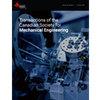基于超级电容器的电池均衡系统的电流控制
IF 0.8
4区 工程技术
Q4 ENGINEERING, MECHANICAL
Transactions of The Canadian Society for Mechanical Engineering
Pub Date : 2024-05-06
DOI:10.1139/tcsme-2023-0129
引用次数: 0
摘要
本文提出了一种基于超级电容器的新型能量均衡系统,并讨论了一种新的均衡电流控制方法。所提出的电池均衡系统由双向升压-降压电路、开关矩阵和超级电容器组成,可实现电池和超级电容器之间的稳定电流传输。电路的降压或升压模式根据电池和超级电容器之间的压降阈值自动触发。为了提高电路的效率,提出了一种改进的金属氧化物半导体场效应晶体管控制逻辑,并设计了一种模型预测控制(MPC)算法来跟踪目标电流。仿真结果表明,对于传统的电流传输电路,在固定的脉宽调制占空比下,电流会剧烈波动。相比之下,所提出的基于超级电容器的能量均衡系统在 MPC 控制器的控制下能很好地跟踪目标电流。在较宽的工作范围内,采用改进控制逻辑的新型能量均衡系统的传输效率比采用原始控制逻辑的传统电流传输电路高出 13.0%。本文章由计算机程序翻译,如有差异,请以英文原文为准。
Current control for a supercapacitor-based battery equalization system
This paper presents a novel supercapacitor-based energy equalization system and discusses a new equalization current control method. The proposed battery equalization system is composed of a bidirectional boost–buck circuit, a switch matrix, and a supercapacitor, which can realize stable electric current transmission between batteries and supercapacitors. The buck or boost mode of the circuit is triggered automatically based on the threshold of the voltage drop between the battery and the supercapacitor. A modified control logic of the metal-oxide-semiconductor field-effect transistor is proposed to improve the efficiency of the circuit, and a model predictive control (MPC) algorithm is designed to track the target current. Simulation results indicate that for a conventional electric current transmitting circuit, the current fluctuates violently under a fixed pulse width modulation duty. In contrast, the proposed supercapacitor-based energy equalization system tracks the target current well under the control of the MPC controller. In a wide operating range, the transmission efficiency of the new energy equalization system with the modified control logic is 13.0% higher than that of the conventional electric current transmitting circuit with the original control logic.
求助全文
通过发布文献求助,成功后即可免费获取论文全文。
去求助
来源期刊
CiteScore
2.30
自引率
0.00%
发文量
53
审稿时长
5 months
期刊介绍:
Published since 1972, Transactions of the Canadian Society for Mechanical Engineering is a quarterly journal that publishes comprehensive research articles and notes in the broad field of mechanical engineering. New advances in energy systems, biomechanics, engineering analysis and design, environmental engineering, materials technology, advanced manufacturing, mechatronics, MEMS, nanotechnology, thermo-fluids engineering, and transportation systems are featured.

 求助内容:
求助内容: 应助结果提醒方式:
应助结果提醒方式:


